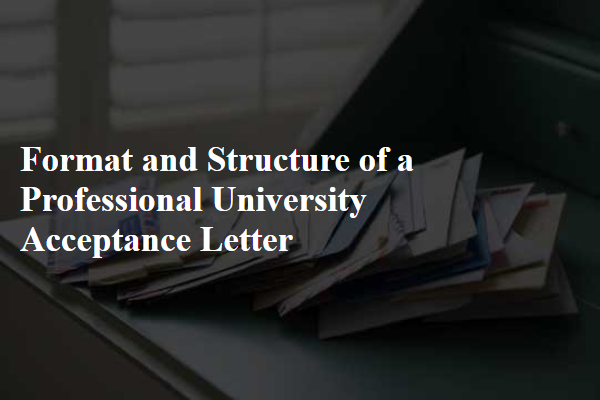
Clearly articulate your academic goals and how they align with the graduate program's strengths to demonstrate informed commitment. Use precise language and a confident tone to convey your qualifications and motivation effectively. Highlight relevant experiences and future research interests to create a compelling narrative that distinguishes you from other applicants.
Understand the Program and Its Values
A convincing letter of intent for graduate school clearly communicates your academic goals and professional aspirations. It reflects your unique qualifications and enthusiasm for the program.
Best practices ensure the letter is impactful and tailored to the specific institution.
- Research the Program - Understand the program's faculty, curriculum, and research opportunities to tailor your letter effectively.
- Highlight Relevant Experience - Emphasize academic achievements, research projects, and professional experiences that align with the program's focus.
- Demonstrate Clear Goals - Articulate your career objectives and how the graduate program will help you achieve them.
Showcase Academic and Professional Achievements
What makes a letter of intent stand out in a competitive graduate school application? A concise and focused letter that clearly outlines your academic goals and research interests captures the admissions committee's attention. Tailoring your letter to demonstrate alignment with the program's strengths enhances your candidacy.
How important is it to highlight relevant academic and professional experiences? Detailing specific projects, internships, or work experience related to your field establishes your preparedness and commitment. Providing concrete examples of your skills and accomplishments strengthens your letter.
Should you address your motivation and career objectives in the letter of intent? Clearly articulating your long-term goals and how the graduate program fits into your plan reflects genuine interest and vision. This helps the committee understand your purpose and dedication to the discipline.
Is it beneficial to mention faculty members you wish to work with? Referencing professors whose research aligns with your interests demonstrates proactive engagement and research alignment. This shows that you have thoughtfully considered how the program's resources match your academic ambitions.
How critical is the tone and style of the letter? Maintaining a professional yet personal voice conveys confidence and authenticity. Proper grammar, clear structure, and concise language improve readability and leave a positive impression.
Articulate Clear Research Interests
Craft a clear and focused Letter of Intent emphasizing your academic background, research interests, and career goals tailored to the specific graduate program. Highlight relevant experiences, achievements, and skills that align with the department's faculty expertise and resources. Use a professional tone and precise language to convey passion, commitment, and suitability for the graduate school opportunity.
Align Your Goals with Faculty Expertise
A convincing letter of intent for graduate school clearly communicates your academic goals and passion for the chosen field of study. It serves as a personal statement that highlights your qualifications and motivation to join the program.
Start by addressing the specific program and faculty to demonstrate your genuine interest. Emphasize relevant academic achievements, research experience, and career aspirations. Use precise, confident language that reflects your commitment and suitability for the graduate program.
Demonstrate Unique Contributions
A well-crafted letter of intent is crucial for admission into graduate school, showcasing your academic goals and professional aspirations clearly. Employers and admission committees look for personalized, focused, and genuine content to evaluate your fit for the program.
- Clear Purpose - Articulate the specific program and research interests that align with your career objectives to demonstrate focused ambition.
- Personalized Content - Tailor your letter to the graduate program by referencing faculty, courses, or resources that attract you, showing thorough research.
- Professional Tone - Maintain a formal, respectful, and concise writing style that reflects your seriousness and communication skills.
Emphasize Motivation and Commitment
Crafting a compelling Letter of Intent is essential for graduate school applications to effectively communicate your academic goals and qualifications. Adhering to best practices ensures your letter stands out to admissions committees.
- Clear and Concise Introduction - Begin with a strong opening that states your purpose and the specific program you are applying to.
- Demonstrate Research Alignment - Highlight how your interests align with the faculty's expertise and the program's strengths.
- Showcase Relevant Experience - Include academic achievements, research, and professional experiences that support your candidacy.
Proofread thoroughly to maintain professionalism and clarity in your Letter of Intent.
Highlight Relevant Skills and Experience
| Best Practice | Description |
|---|---|
| Personalize the Letter | Address the specific graduate program and faculty by name. Show genuine interest in the university's unique offerings and how they align with your academic and career goals. |
| Clear Statement of Purpose | Explain your motivation for pursuing graduate studies in the particular field. Highlight your passion, research interests, and long-term objectives to convey a clear vision. |
| Highlight Academic and Professional Background | Present relevant educational achievements, research experience, internships, or work experience that supports your eligibility and readiness for graduate school. |
| Demonstrate Knowledge of the Program | Discuss specific courses, faculty members, research projects, or resources offered by the graduate program that attract you. Show how this program fits your academic needs. |
| Strong Opening and Closing | Write an engaging introduction that captures attention and a memorable conclusion that reinforces your enthusiasm and commitment to the program. |
| Concise and Focused Content | Keep the letter succinct, typically one to two pages. Avoid redundancy and ensure each paragraph serves to strengthen your case. |
| Professional Tone and Style | Maintain a formal yet approachable tone. Use precise language, active voice, and correct grammar to convey professionalism. |
| Include Specific Examples | Use concrete instances such as projects, presentations, or publications to illustrate your skills and experiences. |
| Proofread Multiple Times | Review the letter thoroughly for spelling, grammar, and formatting errors. Seek feedback from mentors or advisors for constructive critique. |
| Follow Application Guidelines | Adhere strictly to the program's instructions regarding length, format, and submission process to avoid disqualification. |
Craft a Strong Opening and Closing
A compelling letter of intent for graduate school clearly communicates your academic goals and aligns them with the program's strengths. Highlight relevant experiences and skills that demonstrate your readiness and passion for the field. Use concise, confident language to make a strong, personal connection with the admissions committee.
Maintain Professional Tone and Clarity
Crafting a convincing letter of intent for graduate school requires clarity and focus on your academic and professional goals. Highlight specific research interests that align with the program and demonstrate your preparedness.
Provide evidence of relevant experiences, such as internships, projects, or publications, to strengthen your application. Tailor the letter to the institution's values and faculty expertise for a personalized impact.
Edit Thoroughly for Grammar and Precision
Crafting a compelling Letter of Intent for graduate school requires clarity and specificity in outlining your academic and professional goals. Highlight your motivation and unique qualifications that align with the program's strengths.
Demonstrate thorough research on the institution and faculty, linking your interests to their expertise. Maintain a formal tone and proofread meticulously to ensure professionalism and accuracy.



Comments